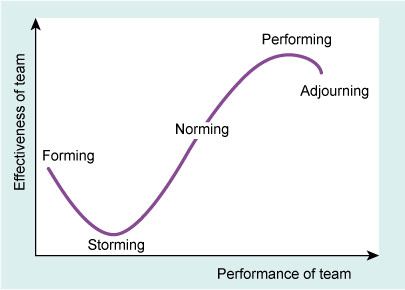2 Building an effective team
Leading a team is a significant element of any leader’s role, and getting the team to work well together should be a key focus.
Bruce Tuckman (1965) suggested a model for team development, still regularly referred to today. It involves four stages:
- Forming – team members are testing boundaries and exploring behaviours i.e. getting to know each other. Your role is to introduce team members and roles, and describe the focus of the team with clarity.
- Storming – members start to push against boundaries, leading to conflict and emotional responses. Your role is to mediate, using your authority as leader when required, helping them to recognise each other’s different work styles etc.
- Norming – the group overcomes previous resistance and finds a new cohesion. Now you can focus on monitoring progress and providing constructive feedback and praise where appropriate.
- Performing – roles become more flexible and functional, and energy is given to the task. This is the stage where you can take a step back, delegate more and focus your attention on developing the team.
Later, Tuckman added a fifth stage: adjourning – where the team is reorganised to work on other projects, or disbanded. This can be a period of uncertainty for everyone involved, perhaps even bringing a sense of loss if the team have performed well.
Understanding the different stages your team might be going through can help you to respond appropriately. For example, recognising that the storming stage is normal – but that with the right mediation it will end – can help you to deal with any personal feelings of frustration or negativity.
There are many sources of online advice about team dynamics and developing a team, but the fundamental elements can be distilled into:
- choosing the right people – ensuring a good mix of skills and knowledge that will complement each other and get the job done
- making sure that team members are clear about the task and are motivated to achieve it
- regular communication – monitoring progress, giving feedback and celebrating success.


